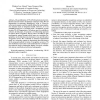Free Online Productivity Tools
i2Speak
i2Symbol
i2OCR
iTex2Img
iWeb2Print
iWeb2Shot
i2Type
iPdf2Split
iPdf2Merge
i2Bopomofo
i2Arabic
i2Style
i2Image
i2PDF
iLatex2Rtf
Sci2ools
106
click to vote
PERCOM
2010
ACM
2010
ACM
Crowdsourced radiomap for room-level place recognition in urban environment
Abstract—The proliferation of WLAN infrastructures has facilitated numerous indoor localization techniques using WLAN fingerprints. In particular, identifying a room or a place in urban environments could be usefully utilized in many application domains such as ubiquitous health. However, it is not straightforward how to bootstrap such a localization sys-tem because WLAN fingerprints of all places must be available in advance. In this paper, we propose a crowdsourcing approach for indoor place recognition. The key idea is to build an open participatory system through which users can contribute fingerprints. As the database size increases, it can provide place recognition service. We conducted an extensive experimental study at a university campus to demonstrate the performance of the proposed method in terms of recognition accuracy. We also studied key factors that could undermine the crowdsourcing approach such as fingerprint density, incorrect contribution, uneven contribution, and...
Computer Networks | Numerous Indoor Localization | PERCOM 2010 | Place Recognition | Wlan Fingerprint |
| Added | 29 Jan 2011 |
| Updated | 29 Jan 2011 |
| Type | Journal |
| Year | 2010 |
| Where | PERCOM |
| Authors | Minkyu Lee, Hyunil Yang, Dongsoo Han, Chansu Yu |
Comments (0)

